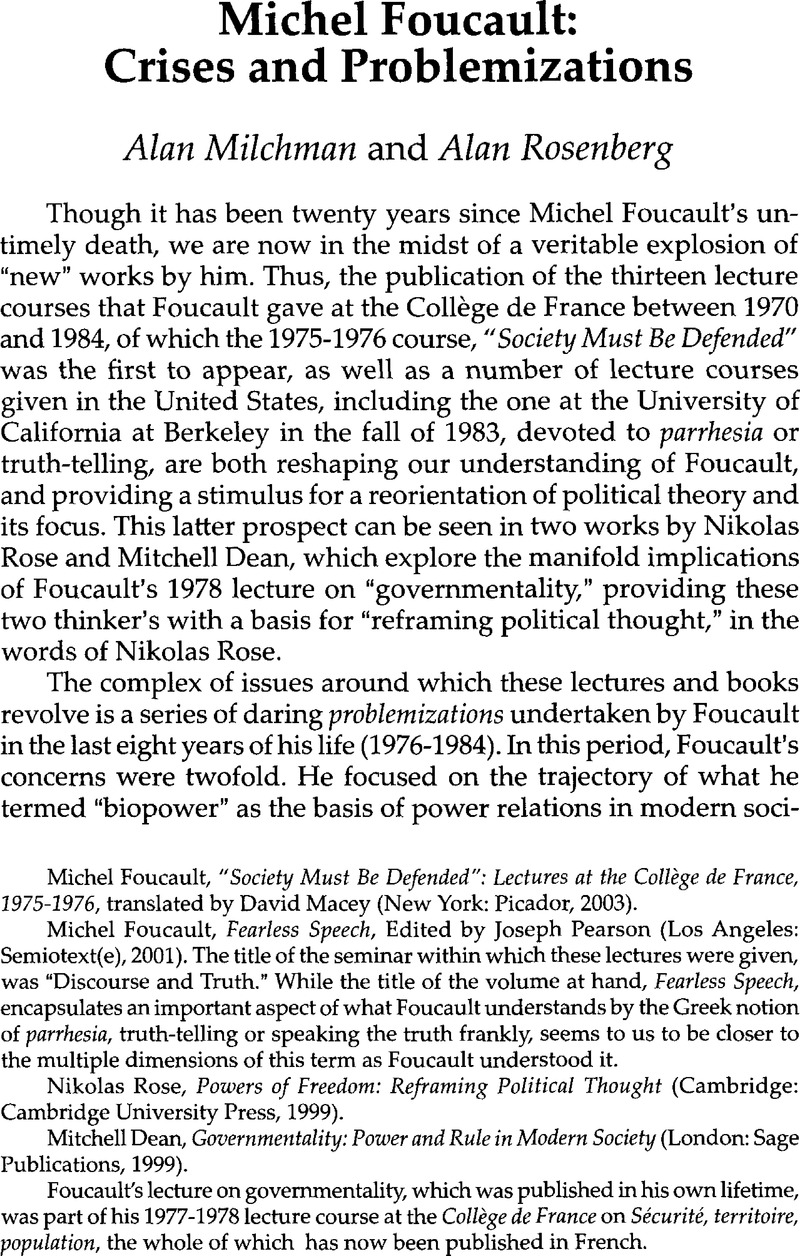Article contents
Michel Foucault: Crises and Problemizations
Published online by Cambridge University Press: 05 August 2009
Abstract

- Type
- Review Essay
- Information
- Copyright
- Copyright © University of Notre Dame 2005
References
1. Foucault, Michel, The History of Sexuality: Volume I: An Introduction (New York: Vintage Books, 1990), p. 143.Google Scholar
2. Ibid., p.139.
3. Ibid.
4. Clifford, Michael, Political Genealogy After Foucault: Savage Identities (New York and London: Routledge, 2001), p. 101.Google Scholar
5. See Foucault's, own response to questions regarding his concept of a dispositif in “The Confession of the Flesh,” in Foucault, Michel, Power-Knowledge: Selected Interviews and Other Writings 1972–1977, ed. Gordon, Colin (New York: Pantheon Books, 1980), pp. 194–96.Google Scholar
6. Macey, David throughout translates assujettissement as “subjugation.”Google Scholar While this is one of the meanings of the term, it accentuates the passive element, and ignores an active element that is also present, depending on context, in Foucault's use of this term: the subject is a product of power relations, for Foucault, but the subject also possesses agency and the possibility of self-fashioning. We owe this point, in part, to Murray's, Stuart J. review essay of “Society Must be Defended,” though Murray's preferred term subjectivation has its own problems, inasmuch as that term, in French, is used by Foucault, in his 1981–1982 lecture course, L'hérméneutique du sujet in a very different senseGoogle Scholar. We prefer to translate assujettissement by “subjectification.” See Murray, Stuart J., “Myth as Critique?” in Philosophy & Social Criticism 30, no. 2 (2004).CrossRefGoogle Scholar
7. To take but one example of where such an investigation might lead, the Foucauldian concept of state racism would seem especially pertinent to understanding the phenomenon of strategic bombing of civilian targets in Germany and Japan by the allies in World War Two, where the objective was precisely to inflict mass death on the population of cities such as Hamburg, Dresden or Hiroshima.
8. Perhaps one of the most insightful analyses of the genocide in Rwanda, written by Dominique Franche, is clearly indebted to Foucault's understanding of racism and its link to biopower. See Franche, Dominique, Rwanda: Généalogie d'un génocide (n.p.: Éditions Mille Et Une Nuits, 1997).Google Scholar
9. Here Dean grasps the complex relationship of subjection and agency in Foucault's understanding of assujettissement [subjectification].
10. Simons, Jon, Foucault & the Political (London and New York: Routledge, 1995), p. 36.Google Scholar
11. Here, one thinks of the claims of Defense and State Department officials that the security situation and reconstruction of Iraq is a resounding success, or to look at the other side, the claim of experts that a trillion dollar budget to modernize the health care system of the U.S. will not entail either higher taxes on the “middle classes,” or massive new budget deficits. The issue here is simply the disconnect between truth and politics as a feature of our democratic world.
- 9
- Cited by


